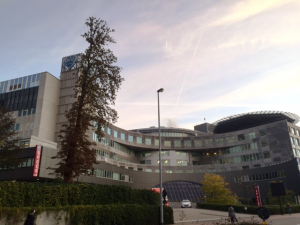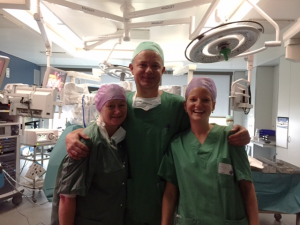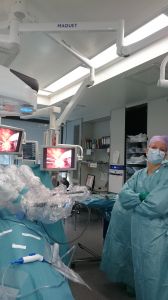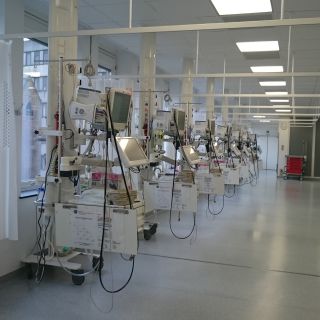EAUN Fellowship Programme on robotic surgery at OLV Hospital in Aalst, Belgium

We work at the Urology Surgery Department at Karolinska University Hospital in Stockholm as operating room nurses specialised in urology surgery and robotic-assisted surgery, and our department mainly treats prostate and bladder cancer patients.
These surgeries are almost exclusively performed robotically today. We do around 600 robotic-assisted cases every year. In 2018

OLV Hospital in Aalst, front view
we will move to the new Karolinska University Hospital which will mainly focus on providing healthcare to patients that need highly specialised surgery and hospital care. It will comprise a larger robotic centre and due to organisational matters and centralised care more advanced robotic-assisted urology surgery will be performed. Not only will we move to a new building, the patients that will be treated here will have different needs.
To meet the future needs of urology surgery that most likely will be performed at the new hospital, we applied for the EAUN Fellowship Programme to gain clinical competence in treating patients suffering from kidney cancer since we felt we lack this competence as operating room nurses. We already know that performing robotic-assisted partial nephrectomies requires a well-prepared operating team with experience and knowledge.
The risk of serious complications such as bleeding and converting to open surgery is always high. The renal artery is clamped prior to the actual partial nephrectomy and the surgeon must operate under ischemia time. Clamping the renal artery and the removal of the clamp is associated with the high risks mentioned above. Also, the positioning of these patients must be performed with great anatomical knowledge to avoid pressure wounds and nerve damage. The fellowship programme would allow us the opportunity to get in-depth knowledge regarding nursing care for these patients, pre, peri and post-operatively.
With our motivational letter, application, clinical history and CV, we received approval from the EAUN Board and we spent one

Dr. Mottrie with Elisabeth Rundin and Linda Söderkvist
week from 17 to 21 of October 2016 in Aalst, Belgium to learn from Dr Alex Mottrie, one of the world leading experts in urological oncology, with a specialty in partial nephrectomies, and his operating team.
“Dr. Mottrie and his operating room staff offered us crucial knowledge regarding the standardisation of the surgical procedures for partial nephrectomies to maintain patient safety during surgery”
OLV Hospital
The surgical department at OLV Hospital in Aalst, Belgium has 17 operating rooms. Urology surgery is performed in three to four of these operating rooms every week, depending on the day. The department has three Da Vinci systems and one of these is the latest version called Xi. Approximately 570 to 600 robotic-assisted urologic cases are performed here every year covering prostatectomies, partial nephrectomies and cystectomies. The hospital performs around 100 robotic-assisted partial nephrectomies every year, or around two cases a week. The Urology Clinic and its surgical department together with ORSI, a clinical training site with dry and wet lab for robotic assisted surgery located some kilometres from Aalst, form a training centre, one of four in Europe. The other three centres are located in Paris, Strasbourg and Stockholm.
As a training centre, the urology surgery department has many visitors from all over the world. Doctors and operating teams that undergo training here are visiting both the hospital and ORSI as part of their training. We could tell that they were very used to educate and teach clinically, something we experienced during our fellowship.
Learning outcomes

Linda on the OR
Dr. Mottrie and his operating room staff offered us crucial knowledge regarding the standardisation of the surgical procedures for partial nephrectomies to maintain patient safety during surgery. The head surgeon (a urologist) and one of the assistant residents showed us how to position the patient prior to surgery and they went through all aspects. The operating room nurses showed and explained all the instruments used and what to have nearby the operating room and what to have ready on the table in case of bleeding or converting to open surgery. The technical aspects of handling the robot during these specific procedures were also explained.
The first assistant taught us port placement for the procedure and what to consider placing these, docking the arms and handling any external conflicts of the robotic arms during this type of surgery. Postoperatively, we followed the patients to recovery room and further to the urology ward. We interviewed an intensive care nurse and a urology ward nurse to find out the crucial aspects of nursing for patients that underwent a partial nephrectomy or a nephrectomy to learn what a normal and expected postoperative recovery is and what is not. The same went for preoperative examination and information to the patient.
Meeting training goals

Post-op unit in the early morning. Very bright and spacious!
Based on our goals, we are satisfied with all the new knowledge and competence we gained from this experience. We have realised that spending time at a hospital outside your own country can provide much more. By learning from others, we started a process of reflecting why we do things the way we do and how we can improve our work. Moreover, it also made us proud of what we have accomplished in our own hospital. Educating ourselves creates an awareness of how we can be the best nurses and provide the best care to our patients.
Elisabeth Rundin, Clinical Manager, Urology Surgery Dept., Karolinska University Hospital, Solna (SE), elisabeth.rundin@karolinska.se
Linda Söderkvist, Urology nurse, Urology Surgery Dept., Karolinska University Hospital, Solna (SE), Linda.soderkvist@karolinska.se

